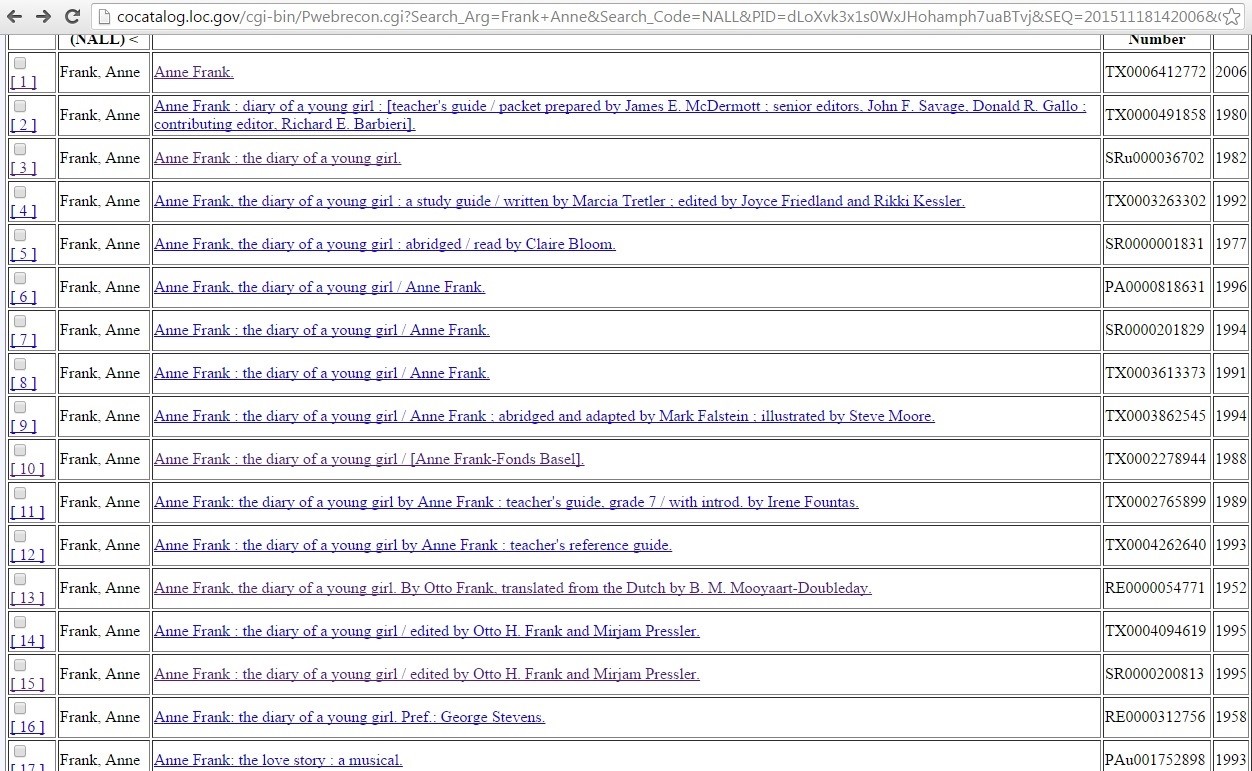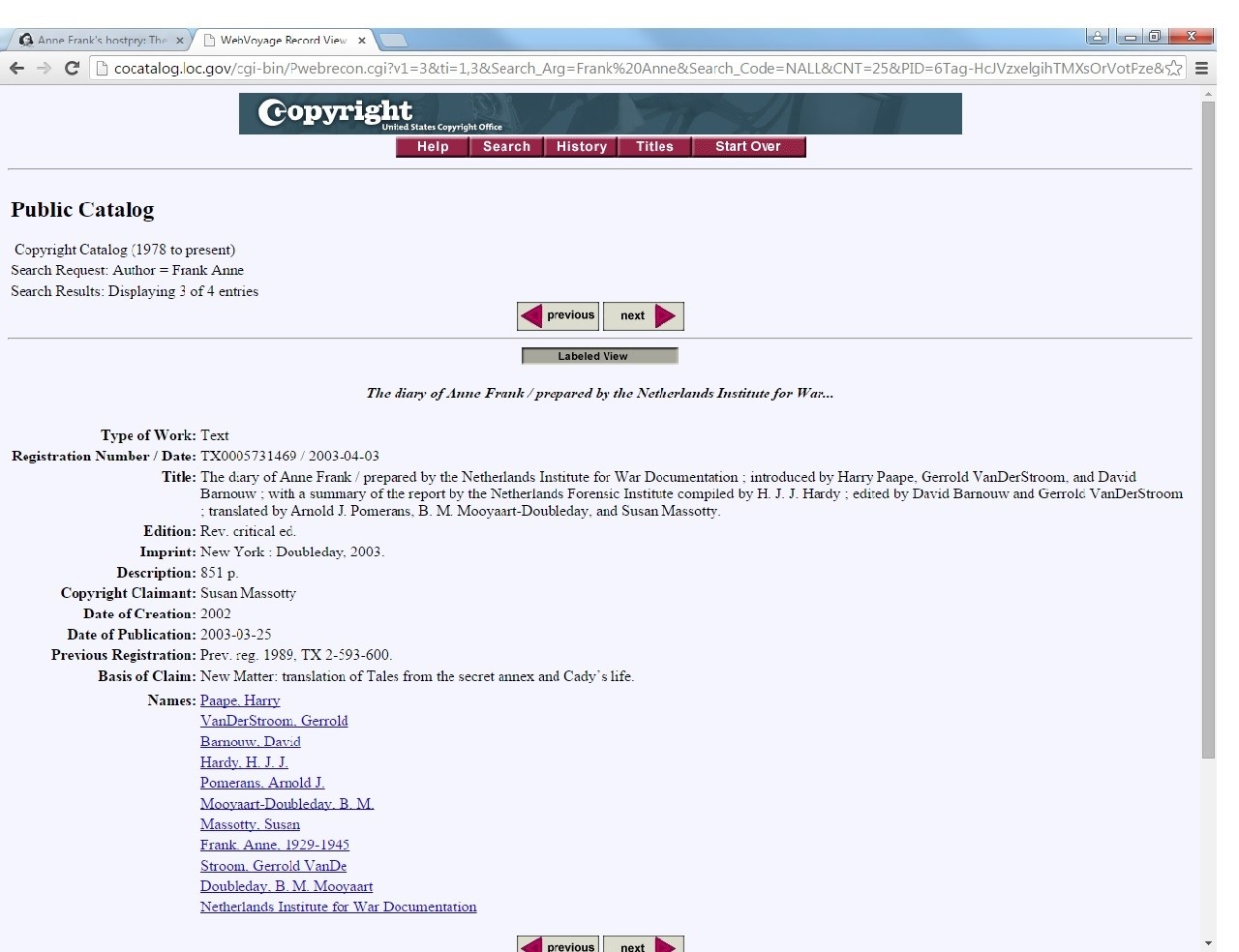Earlier on in this blog, I recounted various underhanded methods by which book publishers attempt to avoid having works go into the public domain. 1 Last week, the New York Times reported that the internationally famous book “Diary of a Young Girl” by Anne Frank had suddenly gained a new co-author, her father, Otto Frank. 2
The reason for this has to do with the copyright afforded Anne Frank. She died in 1945, interestingly enough, the same year as Adolf Hitler. 3 This means that “Diary of a Young Girl” and “Mein Kampf” having both exhausted their “life of the author plus 70 years” copyright term, will both enter the public domain in most of the world on January 1, 2016.
Yet, according to the Anne Frank Fonds, the Swiss foundation that holds the copyright in DOAYG, says that Anne’s father, Otto, is a co-author of the work. So according the Foundation’s theory, DOAYG will not pass into the public domain at the end of this year, but not until 2050, 70 years after the death of Otto. 4
This theory has some fundamental flaws, which will be discussed below. However, since I am not fluent in German, Dutch or Swiss copyright law, my analysis will have to be limited to what the Berne Treaty says on the subject, with some additional analysis of what United States Copyright law provides.
There are in fact, three versions of DOAYG. 5
“At the end of September 1942, after reading one of her favorite books ‘Joop ter Heul’ by Cissy van Marxveldt, Anne decides to write her diary entries in the form of letters to an imaginary group of friends of whom Kitty is her favorite…Anne continues to write in several notebooks, not all of which have been preserved, nearly all of 1943 is missing.
These original diary entries (3 notebooks and the red and white check diary) make up the A version.” 6
“In the spring of 1944 Minister Bolkenstein makes his request on Radio Oranje for diaries and other writings made during the occupation to be kept. Anne decides to rewrite her original diary entries in the form of a novel. She wants them to be published after the war. She starts rewriting on loose sheets of paper on 20 May 1944 and continues in the ten weeks up to her arrest.
These rewritten texts by Anne Frank go up to March 1944 and are known as the B version.” 7
“After the arrest the two helpers, Miep Gies and Bep Voskuijl collect all that they can find of Anne’s writings. A year later when it is clear that only Anne’s father is the only survivor of the extermination camps, Miep Gies gives him his daughter’s writings.
From these Otto compiles the book ‘The Secret Annex’. This version becomes the C version and is a combination of passages from Anne’s A and B versions.
Otto had to use a combination of both of Anne’s versions because the A version is incomplete and the B version ends before 1 August.” 8
“’He merged them, he cut them and he changed them. So he created a new book,’ Yves Kugelmann, a trustee at the Anne Frank Fonds, said in an interview, explaining that the foundation considers Otto a co-author.
As for the diary’s original versions, they weren’t published until after Otto’s death with the release of a critical edition in 1986. So in that case, Mr. Kugelmann said, the copyright for the original versions is in place until 2056.” 9
The problem with this theory is that it confuses copyright protection from when the work is published, instead of when the author created it and when the author died. Both Germany and Switzerland are original members of the Berne Treaty, or since 1887. 10 The Netherlands adopted the Berne Treaty in 1912. 11 So no matter which country’s laws apply, they would have to be congruent with the Berne Treaty, which requires a minimum term of life of the author, plus 50 years after death. 12 This baseline amendment was passed in 1908, 13 so it definitely applies to Anne Frank. Note that because DOAYG was published in the U.S. before adoption of the Berne Treaty here, the 95 year rule applies and DOAYG will continue to be under copyright in the U.S. until 2047. 14
Contrary to what the Foundation may contend, the original diaries will enter into the public domain in most of the world at the end of this year. It does not matter when the diaries, or excerpts, or revised versions were published, nor does it matter who revised them. The guiding law is if Anne Frank wrote the words, these words enter the public domain 70 years after her death, no matter how many times they have been edited or revised.
What Otto did, was create a “derivative work.” Under U.S. law:
“A ‘derivative work’ is a work based upon one or more preexisting works, such as a translation, musical arrangement, dramatization, fictionalization, motion picture version, sound recording, art reproduction, abridgment, condensation, or any other form in which a work may be recast, transformed, or adapted. A work consisting of editorial revisions, annotations, elaborations, or other modifications, which, as a whole, represent an original work of authorship, is a ‘derivative work.’” 15
So, Otto’s “editorial revisions, annotations, elaborations, or other modifications,” did indeed potentially grant him a copyright in the new work “as a whole.” But the later copyright date would only apply to the material that he added that was new. It did not have the effect of creating a new copyright in the underlying work, which were the product of Anne Frank’s pen. Anyone, after the first of the year, can go back to the original text and copy whatever she wrote, in the “life plus 70” Berne Countries.
Next, Otto is not Anne’s “co-author.” She was dead by the time Otto came into possession of the manuscripts. Key to the concept of co-authorship (under US law) is the requirement of “intentional collaboration” of the co-authors, an obvious impossibility here. (The Berne Treaty references “joint authorship” but does not define it.) As Anne’s sole heir, Otto no doubt owned the copyright in Anne’s manuscript, and was well within his rights to edit and modify the work as he saw fit. But, once again, this does not extend the copyright term in and to the preexisting material. Under the plain text of the Berne Treaty, the material Anne wrote is tied to Anne’s lifetime, not Otto’s.
The records of the U.S. Copyright Office are contradictory. Here is a name search for “Anne Frank”:

Some of them identify Anne Frank as the author. Some say Otto Frank is the author. Some say Otto Frank is the editor. And in this registration for a new translation of “The Secret Annex,” (or version “C”) Anne Frank is listed, but Otto Frank is not listed as having any contribution to the work at all. Remember that this is the work that Otto compiled from versions A and B, to which the Foundation contends makes him a “co-author.”

It would seem, that if Otto Frank’s authorship was as clear cut as the Foundation would have you believe, then he should be listed as an author in every instance, certainly for version “C”, and never as just “editor.”
It is understood that the Foundation is primarily a charity, and it “only has three part-time staffers and all the income goes to charity and education projects,” 16 reportedly to the tune of $1.5 million per year. 17
But, enough is enough. Even though the money is going to good causes, that is no reason to attempt to twist the copyright laws into nonsense. Seventy years is plenty enough time to take advantage of the profits of this unique book, which unlike most books, has been an international best-seller every single year that it has been in publication.
Notes:
- Claiming Copyright in Public Domain Works: It’s Time to Put an End to Publishing Sleight of Hand ↩
- Anne Frank’s Diary Gains ‘Co-Author’ in Copyright Move ↩
- Anne Frank’s diary in a copyright law paradox 70 years after her death ↩
- Id. ↩
- The different versions of Anne’s diary ↩
- Id. ↩
- Id. ↩
- Id. ↩
- Anne Frank’s diary in a copyright law paradox 70 years after her death ↩
- List of parties to international copyright agreements ↩
- Id. ↩
- Berne Convention for the Protection of Literary and Artistic Works (Paris Text 1971) ↩
- Berlin Act, 1908 – Revised Berne Convention for the Protection of Literary and Artistic Works of November 13, 1908 ↩
- The Strange Copyright Case of Anne Frank’s Diary ↩
- 17 USC 101 ↩
- Anne Frank’s diary in a copyright law paradox 70 years after her death ↩
- Anne Frank’s Diary Gains ‘Co-Author’ in Copyright Move ↩